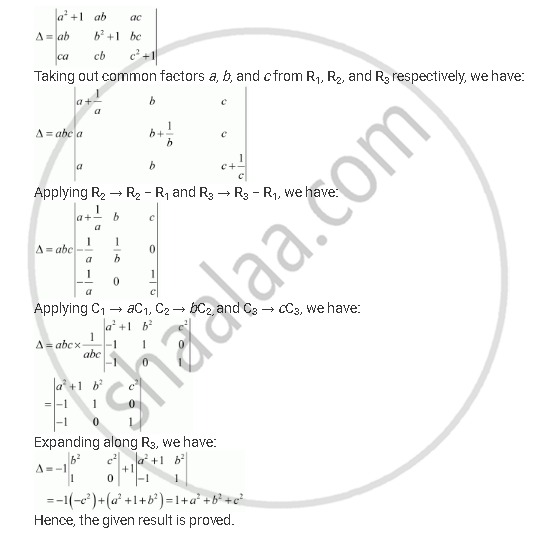Advertisements
Advertisements
Question
By using properties of determinants, show that:
`|(a^2+1, ab, ac),(ab, b^2+1, bc),(ca, cb, c^2+1)| = 1+a^2+b^2+c^2`
Solution

APPEARS IN
RELATED QUESTIONS
Using properties of determinants, prove that
`|((x+y)^2,zx,zy),(zx,(z+y)^2,xy),(zy,xy,(z+x)^2)|=2xyz(x+y+z)^3`
Using the property of determinants and without expanding, prove that:
`|(1, bc, a(b+c)),(1, ca, b(c+a)),(1, ab, c(a+b))| = 0`
By using properties of determinants, show that:
`|(1,1,1),(a,b,c),(a^3, b^3,c^3)|` = (a-b)(b-c)(c-a)(a+b+c)
By using properties of determinants, show that:
`|(x+y+2z, x, y),(z, y+z+2z,y),(z,x,z+x+2y)| = 2(x+y+z)^3`
Using properties of determinants, prove that:
`|(3a, -a+b, -a+c),(-b+a, 3b, -b+c),(-c+a, -c+b, 3c)|`= 3(a + b + c) (ab + bc + ca)
Using properties of determinants, prove that:
`|(1, 1+p, 1+p+q),(2, 3+2p, 4+3p+2q),(3,6+3p,10+6p+3q)| = 1`
Using properties of determinants, prove that
`|(sin alpha, cos alpha, cos(alpha+ delta)),(sin beta, cos beta, cos (beta + delta)),(sin gamma, cos gamma, cos (gamma+ delta))| = 0`
Using properties of determinants, prove that:
`|(1+a^2-b^2, 2ab, -2b),(2ab, 1-a^2+b^2, 2a),(2b, -2a, 1-a^2-b^2)| = (1 + a^2 + b^2)^3`
Using properties of determinants, prove the following:
Using properties of determinants, prove that \[\begin{vmatrix}a + x & y & z \\ x & a + y & z \\ x & y & a + z\end{vmatrix} = a^2 \left( a + x + y + z \right)\] .
Using properties of determinant prove that
`|(b+c , a , a), (b , c+a, b), (c, c, a+b)|` = 4abc
Without expanding the determinants, show that `|("b" + "c", "bc", "b"^2"c"^2),("c" + "a", "ca", "c"^2"a"^2),("a" + "b", "ab", "a"^2"b"^2)|` = 0
Without expanding evaluate the following determinant:
`|(2, 3, 4),(5, 6, 8),(6x, 9x, 12x)|`
Solve the following equation:
`|(x + 2, x + 6, x - 1),(x + 6, x - 1, x + 2),(x - 1, x + 2, x + 6)|` = 0
Without expanding determinants show that
`|(1, 3, 6),(6, 1, 4),(3, 7, 12)| + 4|(2, 3, 3),(2, 1, 2),(1, 7, 6)| = 10|(1, 2, 1),(3, 1, 7),(3, 2, 6)|`
Select the correct option from the given alternatives:
If `|(6"i", -3"i", 1),(4, 3"i", -1),(20, 3, "i")|` = x + iy then
Select the correct option from the given alternatives:
Which of the following is correct
Answer the following question:
If `|("a", 1, 1),(1, "b", 1),(1, 1, "c")|` = 0 then show that `1/(1 - "a") + 1/(1 - "b") + 1/(1 - "c")` = 1
Evaluate: `|(0, xy^2, xz^2),(x^2y, 0, yz^2),(x^2z, zy^2, 0)|`
Evaluate: `|(3x, -x + y, -x + z),(x - y, 3y, z - y),(x - z, y - z, 3z)|`
Evaluate: `|(x + 4, x, x),(x, x + 4, x),(x, x, x + 4)|`
Evaluate: `|("a" - "b" - "c", 2"a", 2"a"),(2"b", "b" - "c" - "a", 2"b"),(2"c", 2"c", "c" - "a" - "b")|`
Prove that: `|(y^2z^2, yz, y + z),(z^2x^2, zx, z + x),(x^2y^2, xy, x + y)|` = 0
The maximum value of Δ = `|(1, 1, 1),(1, 1 + sin theta, 1),(1 + cos theta, 1, 1)|` is ______. (θ is real number)
If x = – 9 is a root of `|(x, 3, 7),(2, x, 2),(7, 6, x)|` = 0, then other two roots are ______.
If the value of a third order determinant is 12, then the value of the determinant formed by replacing each element by its co-factor will be 144.
If `abs ((2"x",5),(8, "x")) = abs ((6,-2),(7,3)),` then the value of x is ____________.
If the ratio of the H.M. and GM. between two numbers a and bis 4 : 5, then a: b is
A system of linear equations represented in matrix form Ax = 0, A is n × n matrix, has a non-zero solution if the determinant of A (i.e., det(A)) is
Let a, b, c be such that b(a + c) ≠ 0 if
`|(a, a + 1, a - 1),(-b, b + 1, b - 1),(c, c - 1, c + 1)| + |(a + 1, b + 1, c - 1),(a - 1, b - 1, c + 1),((-1)^(n + 2)a, (-1)^(n + 1)b, (-1)^n c)|` = 0, then the value of n is ______.
By using properties of determinant prove that `|(x + y, y+z, z +x),(z,x,y),(1,1,1)| =0`
Without expanding evaluate the following determinant:
`|(1, a, b + c), (1, b, c + a), (1, c, a + b)|`
Without expanding determinants, find the value of `|(10, 57, 107), (12, 64, 124), (15, 78, 153)|`
Without expanding determinant find the value of `|(10,57,107),(12,64,124),(15,78,153)|`
Without expanding determinants, find the value of `|(10, 57, 107),(12, 64, 124),(15, 78, 153)|`
